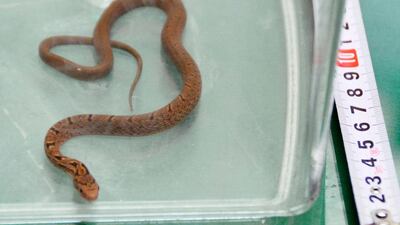TOKYO // A Japanese bullet train was forced to make an emergency stop on Monday after a snake was found slithering between the seats, local media reported.
A passenger spotted the 30 centimetre serpent poking between a gap in the seats, prompting the train which was travelling between Tokyo and Hiroshima to stop and allow police to capture the slippery stowaway.
Despite its menacing appearance, the brown snake was not believed to be poisonous.
No injuries were reported, according to Japan’s public broadcaster NHK, speculating that the reptile could be a juvenile ratsnake.
Train staff made announcements asking if any passengers had misplaced a snake, but no one came forward and police were still looking for the owner, media added.
Japan’s bullet trains are famous for their punctuality and the Nozomi 103 service was no exception, arriving in Hiroshima right on time despite the reptilian intrusion.
Five years ago, a metre-long Honduran milk snake – also non-venomous despite its fearsome red and black stripes – was discovered on a bullet train near Kyoto, bringing it to a halt.
Bullet train operators prohibit passengers from bringing animals other than small birds or fish in containers on board.
Where seemingly benign issues such as leaves on the track can delay trains in Britain, bullet trains rarely stop in Japan, where it usually takes a major incident such as a suicide or an earthquake to bring them to a halt.
* Agence France-Presse

